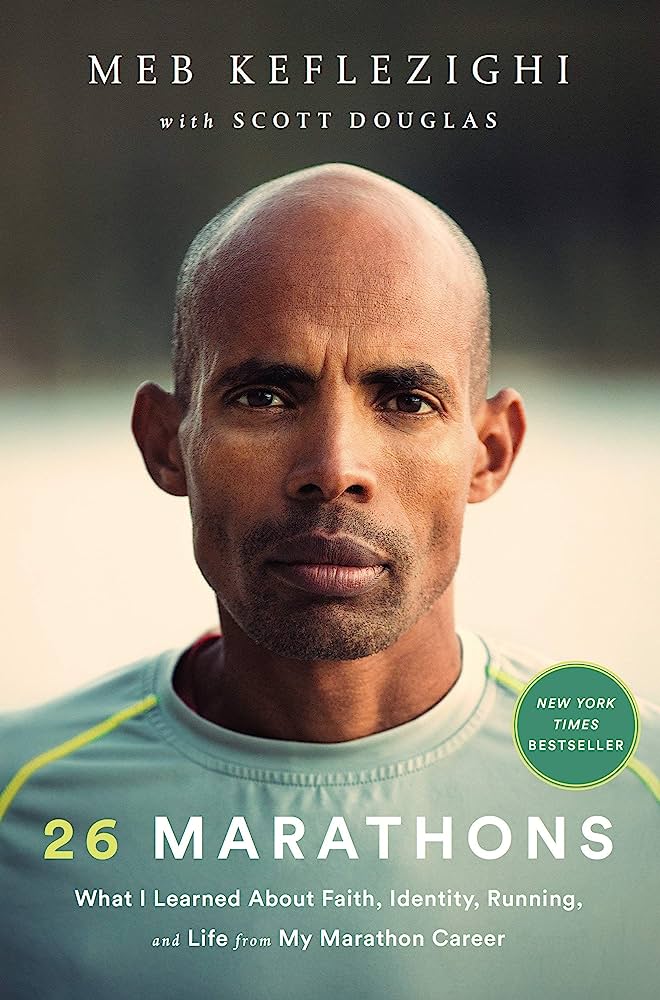“If you want to run, run a mile. If you want to experience a different life, run a marathon.”
In 26 Marathons: What I Learned About Faith, Identity, Running, and Life from My Marathon Career, four-time Olympian and marathoner Meb Keflezighi shares the life lessons he’s learned from each of the twenty-six marathons in his running career.
The book is organized by marathon, one per chapter, presented chronologically. The lessons cover everything that contributed to my success, which is to say pretty much everything imaginable—pacing and race tactics, family and faith, nutrition and training, mental toughness and goal setting.
Run to Win Philosophy
“Run to win” doesn’t mean always trying to finish first. Run to win” isn’t about finishing first, but about getting the best out of yourself.
Marathon #1: 2002 New York City Marathon
November 3, 2002
Place: 9th Time: 2:12:35
Key Lesson: Marathoners always need to be grounded in reality
It’s easier to get run down at high elevations than at sea level, because your body is under extra stress from the limited oxygen. That’s what makes altitude training effective—once you get accustomed physically and mentally to the more difficult conditions, racing at sea level is easier.
Marathon #2: 2003 Chicago Marathon
October 12, 2003
Place: 7th Time: 2:10:03
Key Lesson:
You don’t have to swing for the fences in everything you do. Cruise control can be an effective, low-stress way not only to run your fastest but to reach your full potential in many areas of life.
Always pushing as hard as you can is more likely to lead to injury or being overtrained than to peak performance. The repeated right efforts are what bring results and confidence.
Marathon #3: 2004 Olympic Marathon Trials
February 7, 2004
Place:2nd Time: 2:11:47
Key Lesson: Underpromise and overdeliver
You don’t have to swing for the fences in everything you do. Cruise control can be an effective, low-stress way not only to run your fastest but to reach your full potential in many areas of life.
Marathon #4: 2004 Olympic Marathon (Athens, Greece)
August 29, 2004
Place: 2nd Time: 2:11:29
Key Lesson:
Experience isn’t everything. Have belief in your abilities and confidence in your preparation.
As my career progressed, experiences I had in training and racing helped me make better decisions on how to work toward my goals. In general, I’d prefer that the people fixing my car, doing my taxes, and educating my daughters aren’t just starting out. But experience can be overrated. Being relatively new to something can mean putting fewer limits on yourself. You might also be more motivated to do your best the third time you take on a challenge than the thirtieth.
“My experience in Athens is an example of how working hard and believing in yourself can get you far even if you’re not a veteran at something. You’ll never know if your time has come if you don’t try!”
Experience can be overrated.
- Paula Radcliffe of Great Britain won the London Marathon and almost broke the world record in her debut. She then set world records in her next two marathons.
- Alberto Salazar won the first four marathons of his career—three times in New York City, once at Boston. Even at the Olympics,
- Emil Zatopek of Czechoslovakia won the marathon at the 1952 Games in his first go at the distance, and John Treacy of Ireland took silver in the 1984 Olympics in his marathon debut.
“Part of working hard is having the discipline to know when enough is enough. Grow your capabilities over time, not suddenly two months before a big race.”
Marathon #5: 2004 New York City Marathon November 7, 2004
Place: 2nd Time: 2:09:53
Key Lesson:
Celebrate your accomplishments but don’t rest on your laurels. Use the momentum from one success to work toward others.
After one big accomplishment, be as dedicated to recovering from it as you were to meeting it. Say you’ve completed a months-long project at work. If possible, plan to step away from that mode of working right after. A few days of doing fun things you weren’t able to while busy should rejuvenate you more than a few weeks of sort of working, sort of relaxing. You can emerge refreshed from this concentrated recovery but still keep your momentum going from one big goal to the next.
Marathon #6: 2004 New York City Marathon November 6, 2005
Place:2nd Time: 2:09:56
Key Lesson:
Small personal victories can show you that even greater things are possible in the future.
Go One Less Mile
People talk about going the extra mile, about how doing so is a sign of how dedicated you are. I thought, “No, go one less mile. Prevent a big setback from pushing too hard.
“Go one less mile” doesn’t mean slacking off. It means knowing your limits, pushing up to the edge of them, and then having the discipline to pull back a bit. In running, you’ll make more progress and get injured less often if you finish runs feeling like there’s more in the tank.”
All the Best in your quest to get Better. Don’t Settle: Live with Passion.

Comments are closed.